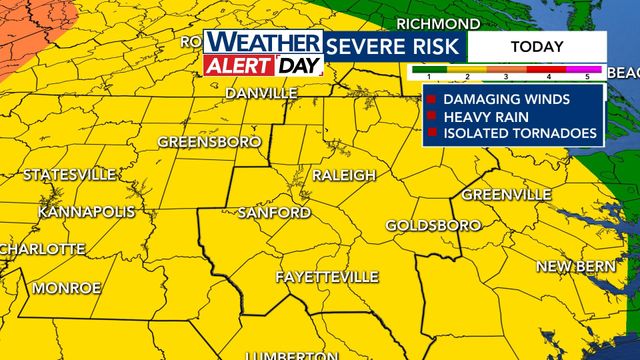Trump's MAGA movement won big in NC primaries. Could that be a good thing for Democrats?

Republican Party voters in North Carolina made it clear Tuesday that they’re all-in with former President Donald Trump in 2024 — and with other candidates up and down the ballot who eschew what used to be stereotypical GOP norms and embrace Trump’s “Make America Great Again” movement instead.
In almost every major race in the primaries, conservative voters chose the candidate most closely aligned with the MAGA movement and its anti-elite messaging — in some cases, jettisoning incumbents to do so.
A homeschool mom who calls public schools “socialism centers” beat the incumbent Republican state superintendent. For labor commissioner Republicans rejected a member of legislative leadership, picking instead a candidate who campaigned on promises to oppose Covid-19 vaccine mandates and to “Make Elevators Great Again.” For secretary of state, in charge of oversight for businesses and charities, GOP voters picked a former professional baseball player who ran a heavily conservative campaign over a moderate, retired health care executive.
And of course there’s Lt. Gov. Mark Robinson, whose commanding stage presence, conservative populism and history of controversy makes him the state’s most comparable GOP candidate to Trump. Trump endorsed Robinson on Saturday, calling him “Martin Luther King on steroids.”
“I've got guys out here that are not my blood brothers, but are practically my spiritual brothers,” Robinson said in a speech after winning the Republican gubernatorial primary. “They've seen the days of poverty. They've seen the days of hunger. They've seen the days of struggle. But like North Carolina herself, we've risen past that to see a better day.”
Robinson handily defeated two establishment-backed opponents including Salisbury businessman Bill Graham, who blasted Robinson as extreme and “unelectable” when he conceded the race Tuesday night.
Graham was endorsed by the state’s senior U.S. senator, Thom Tillis, who’s widely credited with leading the GOP takeover of state politics in 2010. But Tillis was formally censured by the North Carolina Republican Party at last year’s annual convention — where Trump was the keynote speaker — and saw his preferred candidate place third in Tuesday’s primary for governor.
There was no Republican primary for state attorney general, where Republican nominee Dan Bishop went unopposed by any fellow conservatives. Bishop, a U.S. representative from the Charlotte suburbs, voted on Jan. 6, 2021, to overturn the 2020 election results and keep Trump in power. In Congress he’s a member of the conservative Freedom Caucus, alongside fellow politicians Rep. Matt Gaetz, R-Florida, and Rep. Lauren Boebert, R-Colorado. Gaetz and Boebert traveled to Trump's Greensboro rally Saturday, where Bishop and Robinson also gave speeches.
“With Mark Robinson, Donald Trump, Dan Bishop all at the top of the ticket, that’s a clear message to voters about what the Republican Party stands for,” said Chris Cooper, a political science professor at Western Carolina University. “And now it’s up to voters to decide.”
Commerce concerns
The sheer number of MAGA victories in the primaries is raising alarm bells for the North Carolina Chamber of Commerce, which in the past has spent millions of dollars backing GOP candidates. In a newsletter Thursday, the business booster group called the rightward shift in the GOP primary a cause for concern for businesses around the state.
“Tuesday’s primary election results were a startling warning of the looming threats to North Carolina’s business climate,” the Chamber wrote. “While we celebrate the victories of Chamber-backed candidates, many of the races we were watching turned for candidates that do not share our vision for North Carolina.
“Particularly in Republican races, populist candidates enjoyed great success,” the group continued. “In many instances, previously unknown candidates defeated sitting legislators and elected officials with stronger qualifications, pristine voting records, and significantly more funding.”
In the Charlotte suburbs state Rep. Kevin Crutchfield — a business executive who’s co-chair of the N.C. House Small Business Caucus — was ousted by Christian missionary Brian Echevarria. Before the election, Echevarria shrugged off criticisms for hiring a campaign consultant tied to the Proud Boys, an anti-government militia whose members were involved in the Jan. 6, 2021, attack on the U.S. Capitol by Trump supporters attempting to overturn the results of the 2020 election. The group’s leader was sentenced to 22 years in prison last year, for his role in the Capitol attack.
One of the people at the Capitol on Jan. 6 — who has said in interviews that she supported the intent but opposed the violence — was homeschooling activist Michele Morrow of Cary. She also defeated a Republican incumbent, Superintendent of Public Education Catherine Truitt, in Tuesday’s primary. The state superintendent oversees the state’s public schools.
Like the right-leaning Chamber, Democratic nominee for governor Josh Stein has also raised concerns about the future of the state’s economy should voters elect Robinson or other right-wing candidates in November. In his victory speech Tuesday night he said he doesn’t want to see a repeat of the national boycott against North Carolina in 2016 by businesses, musical artists, sports leagues and others in opposition to the state’s short-lived, anti-transgender bathroom law known as HB2, which was sponsored in the state legislature by Bishop.
“We’re at a crossroads,” Stein said Tuesday night. “And the choice before us? Two competing visions of North Carolina.”
‘No purple’
Republican voters’ embrace of MAGA candidates, even over incumbents who’ve proven their ability to win, is now raising questions about what it means for the GOP’s hopes in November.
In 2022 Democrats won close races around the nation against Republican candidates seen as too close to Trump, particularly if they had embraced his election denial rhetoric.
Locally, Republican candidate Bo Hines lost a congressional election to Democrat Wiley Nickel in a Triangle-area district that on paper should’ve elected a Republican. Nickel campaigned as a moderate, and Trump’s endorsement in that race is now seen as having hurt Hines in the eyes of some more establishment-friendly Republicans in that district. Nickel isn’t seeking reelection; Republican legislators redrew his district last year to heavily favor GOP candidates.
Cooper, the Western Carolina professor, said it’s notable that in 2024 many of the biggest elections in North Carolina won’t have a truly moderate option on the ballot from any party. Although the state is incredibly close in general — Trump won North Carolina by just 1.5% of the vote in 2020 — both parties could struggle winning over undecided voters who don’t identify as either red or blue partisans, he said.
“I don't hear that from Mark Robinson, and I don’t even really hear that from Josh Stein,” Cooper said. “I think it’s likely that we are going to continue to see a purple North Carolina with almost no purple representation.”
Jan. 6 ‘hostages’
Trump won all 100 counties and 74% of the total vote in his North Carolina primary against Nikki Haley, who served as Trump’s ambassador to the United Nations but whose candidacy has been seen as a stand-in for the “never-Trump” bloc of the Republican Party.
In a speech introducing Trump at a Greensboro rally he held Saturday, U.S. Rep. Virginia Foxx, a Banner Elk Republican, slammed Haley as a neoconservative — the guiding political philosophy of the Republican Party as recently as the George W. Bush and Barack Obama administrations, now reduced to a pejorative.
Before Trump spoke in Greensboro, the crowd chanted “U-S-A!” as his campaign played a video honoring people imprisoned for the Jan. 6 violence, who Trump praised as “hostages.” During his speech Trump repeated previously debunked claims about a stolen election and falsely claimed that 82% of Americans believe Biden isn’t the legitimate president — polling numbers that aren’t reflected even among just GOP voters, let alone Americans as a whole, PolitiFact NC reported.
Cooper said that while that sort of rhetoric hurt Republicans in 2022, it remains to be seen what’ll happen in 2024. Trump is likely to be on the ballot once again, and he has a track record of turning out voters who don’t show up when he’s not on the ballot.
“A year ago I’d say that you can’t be all about Jan. 6 and win,” Cooper said. “But when Donald Trump came to Greensboro, he talked about the ‘hostages.’ That was the word he used. So when the leader of the party is using that sort of language, it normalizes it for all other candidates.”
Democrats are hoping, however, that even if Republican primary voters supported MAGA-affiliated candidates on Tuesday, there will be enough moderate Republicans or undecided voters to flip key seats for Democrats. That’s what happened in 2022 in Pennsylvania’s governor’s race —an election some Democratic insiders see as the blueprint for North Carolina this year.
Both feature key similarities: A swing state. A Jewish Democrat against a Republican accused of anti-Semitism. And tens of millions of dollars flowing in for ads both for and against each candidate. In the end Shapiro defeated his Trump-endorsed GOP opponent, Doug Mastriano, in a landslide.
Stein is hoping for — and Republicans such as Graham and Tillis are fearing — a similar result in North Carolina this year.
But Robinson told his supporters Tuesday not to pay attention to those who would use his past statements against him.
“We were able to withstand withering attacks from our opponents, all of which were baseless," Robinson said in his victory speech Tuesday. "We firmly stand by what we believe in, who we are."
He added: “I am a person who has a deep love for the state of North Carolina. Why? Because the state of North Carolina has been doggone good to Mark Robinson.”















